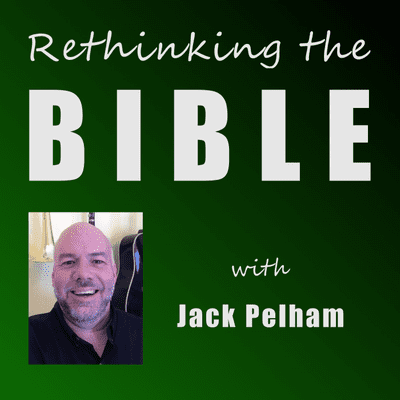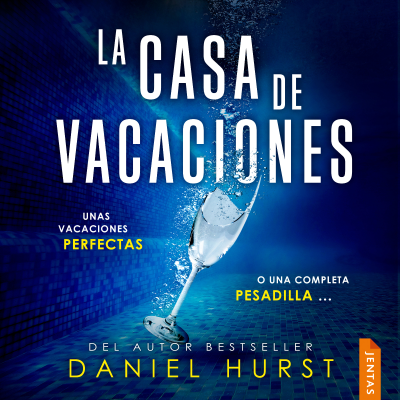
Rethinking the Bible with Jack Pelham
inglés
Historia
Disfruta 30 días gratis
4,99 € / mes después de la prueba.Cancela cuando quieras.
- 20 horas de audiolibros / mes
- Podcasts solo en Podimo
- Podcast gratuitos
Acerca de Rethinking the Bible with Jack Pelham
Applying Reality-Based Thinking to the Bible
Todos los episodios
18 episodiosEpisode 51: These Are Your Choices
[https://www.addtoany.com/add_to/facebook?linkurl=https%3A%2F%2Frethinkingthebible.com%2F2023%2F07%2F10%2Fepisode-51-these-are-your-choices%2F&linkname=Episode%2051%3A%20%20These%20Are%20Your%20Choices] [https://www.addtoany.com/add_to/twitter?linkurl=https%3A%2F%2Frethinkingthebible.com%2F2023%2F07%2F10%2Fepisode-51-these-are-your-choices%2F&linkname=Episode%2051%3A%20%20These%20Are%20Your%20Choices] [https://www.addtoany.com/add_to/email?linkurl=https%3A%2F%2Frethinkingthebible.com%2F2023%2F07%2F10%2Fepisode-51-these-are-your-choices%2F&linkname=Episode%2051%3A%20%20These%20Are%20Your%20Choices] [https://www.addtoany.com/add_to/pinterest?linkurl=https%3A%2F%2Frethinkingthebible.com%2F2023%2F07%2F10%2Fepisode-51-these-are-your-choices%2F&linkname=Episode%2051%3A%20%20These%20Are%20Your%20Choices] [https://www.addtoany.com/add_to/reddit?linkurl=https%3A%2F%2Frethinkingthebible.com%2F2023%2F07%2F10%2Fepisode-51-these-are-your-choices%2F&linkname=Episode%2051%3A%20%20These%20Are%20Your%20Choices] [https://www.addtoany.com/add_to/mewe?linkurl=https%3A%2F%2Frethinkingthebible.com%2F2023%2F07%2F10%2Fepisode-51-these-are-your-choices%2F&linkname=Episode%2051%3A%20%20These%20Are%20Your%20Choices] [https://www.addtoany.com/share#url=https%3A%2F%2Frethinkingthebible.com%2F2023%2F07%2F10%2Fepisode-51-these-are-your-choices%2F&title=Episode%2051%3A%20%20These%20Are%20Your%20Choices] DESCRIPTION Jack discusses the big picture of our choices here on this Earth where God set our lives. He demonstrates that basically, we have two choices, and can pretend more. THE SCRIPT FOR THIS EPISODE When faced with a reality in which your spirit was created by God and will have to give an account for what you’ve done when your life is over, these are your choices, as it appears to me: 1. Embrace the situation and sincerely do your best to please God, learning as you go. 2. Reject the reality, and live however you want, either: 1. Forthrightly denouncing the reality in full (as an atheist might), 2. Being sloppy about some of the details of what God wants, and pretending that sloppiness is OK, or 3. Deliberately twisting some of the details into something you like better, and pretending you’re devoted to God as you do it. (Think about it: #2 is also an example of this #3.) Or in other words, you can live your life either: 1. Really listening to God, or 2. Not really listening to God. Or in other words, still, you can live your life either: 1. Trying to please God, or 2. Trying to please yourself. And if you’re into the choices I’ve highlighted above in orange, your choices seem to be either: 1. To go it alone, or 2. To enlist the help of any of a great many organizations and opportunists who are ready and willing to help you feel good about doing less than your best to please God. And if you join an organization, there will be some issues with that they practice and teach. And when these become apparent (assuming they won’t correct themselves), your choices will be either: 1. To stand up for what’s right, or 2. To stay in the organization, either: 1. Making your own judgment that staying is more important than pleasing God, or 2. Twisting the matter in your head, and pretending that God thinks it’s more important for you to stay in the organization than to set the matter right. I had a preacher tell me quite adamantly once that “Being unified (with the church) is more important than being right.” I had another tell me that if I couldn’t be quiet about the church issues I had been wanting to discuss, I would have to leave the church. I had another chide me (in a closing prayer) about asking questions that were “merely interesting, and not of core importance”. I had another chide me (for not belonging to a church) because we all “need accountability”. Ironically, the reason I wouldn’t join his church is that I thought they were not being accountable to God on several points of scripture. It seems he was deeming accountability to church as more important than accountability to the teachings of the scriptures. If you care about (really) pleasing God, and you belong to a church, it is inescapable that issues will arise in which the church is wrong in belief or practice. And if you are right about the issue, and don’t cower about it, it’s going to put the church in the position of either repenting, or deciding to please itself and to displease God. There are no other choices. And this puts you in the position of having to choose which is your master, the church, or God. > No one can serve two masters. Either you will hate the one and love the other, or you will be devoted to the one and despise the other.Jesus. Matthew 6:24 [http://www.biblegateway.com/passage/?search=Matthew+6%3A24]. NIV These are your two choices, according to Jesus: 1. Hate the one and love the other, or 2. Be devoted to the one and despise the other. And if you don’t like either of these choices, you can pretend that pretending to do both is a viable option. This, of course, will offend God, who will eventually tell you so face-to-face, even though you already knew better, because you’ve read this and many other passages of scripture. I have certainly seem some churches who trade on the idea that they’re more serious than most about getting things right. But I have not yet found one that isn’t quite at home adopting certain beliefs and practices that seem quite notably inconsistent with the scriptures in various ways. Nor have I seen one that leaves its members free to dissent on those particular points of practice and belief. In the ones I have seen, the institution sets itself between God and the member, who is supposed to be pleasing God, primarily by being a member, it would seem—for seldom does anything arise that seems to trump the supposed importance of membership. And they’ll find you a Bible verse for that, even if they can’t be troubled to find you a verse for something else. And you will have to decide—have to choose—whether to believe all this pleases God or not. As for me, I think it angers him considerable, and that we have more than enough information in the Bible by which to know better. And all this pretending people do is an abuse of the faculty of imagination that God gave us. Our choices are these: 1. to follow God, 2. to follow Satan, or 3. to pretend we are following God when we are not, which is just another form of #2—following the thinking of Satan. ADAM AND EVE Regarding this pretending, let’s look at what Satan did when he wanted to draw Adam and Eve away. They had been told not to eat that certain fruit. And when Satan encourages Eve to do it anyway, does he say, > “I know you’re not supposed to eat it, but what I’m suggesting is that you should do is to completely reject God and everything he says, and swear off believing in God forever.”? Is that what he says? No. He says this: > “You will not surely die. For God knows that when you eat of it your eyes will be opened, and you will be like God, knowing good and evil.” Genesis 3:4b-5. ESV He doesn’t suggest that she totally reject God. Nor does he suggest that she completely devote herself to pleasing God to the best of her ability. Rather, he seems to model this option of searching for another way—of finding a way that might not sound perfect, but surely doesn’t sound too bad, either. He seems to be suggesting that some good will come from it—that this is, indeed, a good and desirable choice, and that God will get what he wants from it, by which I mean that they will end up knowing good and evil. And perhaps surprisingly, I do think that not only did God fully expect them to sin that day, and that it was his plan to let it happen, but that the letting it happen was the very plan for the day. I think that through this episode, God was demonstrating that man was not created ready to live with God, and that even in this fairly simple order of you can eat all this, but don’t eat that, man was not yet mature enough to grasp the importance of that. And Adam and Eve would indeed learn it before they died, I believe. And that’s the point of all our lives—to learn to follow God well while we are here—in the small things and the big things. And Satan seems to suggest or imply to Eve that they can disregard God in this one little thing, and achieve something of even greater importance as a result. Well, ironically, they did learn quite a lesson about good and evil that day—or, I should say, they began to learn it. No, God did not want them ever to sin, but he had not created them incapable of it. Rather, they had the faculty of choice—by design, mind you—and this was the day when they would first get their hands dirty, learning that disobedience to God has consequences. And for the record, it was also the end of that first period of their lives, in which God had let them see at least some of the glory of what it would be like to live in his presence in some way—however it was that things worked there in the Garden. They had seen it for themselves, and lived it for a while, however long that was. And while we’re on that question, let me mention briefly that the Bible-66 doesn’t speak to the question of how long they were there before they sinned, though a few of the Ancient Near Eastern extrabiblical books do mention it. They do disagree, however, so make of it what you will. The Book of Jubilees and The Life of Adam and Eve (Latin—Vitae Adae Evae) have Adam and Eve in the Garden for 7 years before they sinned. Meanwhile, The First Book of Adam and Eve say they did not keep the command for a day. And The Book of the Secrets of Enoch (2 Enoch) says they were five and a half hours in the Garden. I’ve documented these four sources in a post on my blog at https://jackpelham.com/2023/05/21/how-long-were-adam-and-eve-in-the-garden/ [https://jackpelham.com/2023/05/21/how-long-were-adam-and-eve-in-the-garden/ ]. But let’s get back on track here. The nature of the temptation Satan rolled out that day was this: He did not tell them to go all out to obey and please God. Nor did he tell them to go all out to disobey and displease God. Rather, he suggested an alternative that involved some disobedience regarding a simple command that was on the record, and seemed to suggest that some good would come of it—some good that would please God, even—something that would turn out OK in the end. Well, it did turn out OK in the distanct end, but not before it cost the life of Jesus to make it right. So there’s that. And I’m not sure I grasp all of this well in my head just yet. There may in fact be some manner of paradox in all this: That defying the simple command not to eat that fruit was the first instance of sin that had been inevitable all along, and that would become the first big focal moment in the long story of the sin of humankind. That is, it had to start somewhere, and this was the day. So they had a command not to do it, but God knew that even though they did not yet have a mature and responsible spiritual view of things, they would indeed fool around and find out. And yes, Satan had indeed lied in the part where he said they would not surely die. So he did in fact deceive Eve with that lie, in hopes of getting her to eat. And he was condemned for it—even if God did have a plan to make things right again with Adam and Eve and with all the rest of us who would sin on our own watch. But let us not miss the fact that Satan seems to have presented the first occurrence of the “it’s for a good cause” temptation. That is, if you eat this, “your eyes will be opened, and you will be like God, knowing good and evil”. Do you see the “good cause” in that? Well, that may have been good after all. It seems it was supposed to happen, even though it happened predicated upon their first sin. And thus began the greater part of the saga of mankind—that he had before him from the very beginning the choice between following what God says, and following anything else. And it appears to me that this was the first instance of mankind abusing his faculty of imagination that God gave him—imagining a way forward through this cognitive dissonance of “don’t eat” and “go ahead, it’s OK”. Neither Adam nor Eve said, “Wait! Stop the presses! I’ve got two conflicting thoughts running in my head at once—both that I shouldn’t eat, and that eating would actually bring about a good result—so I had better stop right now and get this decided before I do anything else!” They didn’t do that. Rather, they seem to give in to what their immediate company was saying and doing. It had started with Satan’s suggestions, but then Eve got the idea in her own head, and became something of an accomplice in the willingness to commit the crime. And Adam, seeing Eve eat, was also enticed and became a member of the conspiracy, too. And not once, so far as we are told, did it occur to them that they were conspiring together against God. We ourselves are very good at the so-called “justifying” of such things. We know enough that we might have told ourselves, “Well, it is quite a small command, and of little importance as there is so very much fruit here.” But we have little evidence as to whether Adam and Eve would have yet known how to do what we call “rationalizing”—although this may be exactly what we’re being shown when the account tells us: > So when the woman saw that the tree was good for food, and that it was a delight to the eyes, and that the tree was to be desired to make one wise, she took of its fruit and ate, and she also gave some to her husband who was with her, and he ate. Genesis 3:6. ESV I’m not sure we can be certain whether this is the author running down the list of all the relevant factors that were in play, or whether this was a list that Eve was using to “justify” the disobedience in her own mind. I could see it either way. Certainly, in our case, it can quite go like this: Hmmm. While it’s true that I know I shouldn’t eat donuts, they are such tasty food, and look so beautiful, and it’s always fun to eat them with others—especially if there’s milk, or coffee, at least—but more than that, I’ll be really serving my friends to give them donuts, too. * Tasty * Beautiful * Good for fellowship * Better with milk or coffee * I’ll be providing a valuable service And suddenly, eating the donuts doesn’t just sound like something that’s not a huge infraction of what is right and proper, but something that is right and proper in at least five ways. And we even have two words for this sort of mental work we do, getting from Point A (don’t eat that) to Point B (eating that could actually be good). Those words are “justify” or “justification” and “rationalize” or “rationalization”. But they are neither just nor rational. They’re not proper thinking and they’re not based in reality. They are abuses of the imagination. And even so, very few humans ever seem to notice that these two words are improperly used most of the time. So we continue to use them, thinking ourselves OK in doing so. We’re not thinking that we’re in utter rebellion, and we ignore the question of whether we are in utter obedience. Rather, we try to satisfy ourselves that this is good enough—whatever it is we are wanting to do. So we come up with reasons by which to convince ourselves and those around us. And away we go. And God expects us to learn what’s wrong with this. Through the teachings of scripture and through the hard lessons of cause-and-effect, he expects us to learn our lessons, and to cut it out. But do we? We have two choices: 1. Cut it out and live eternally with God. 2. Don’t cut it out, and don’t live eternally with God. Or, 3. Pretend that there’s a way to don’t cut it out, and still live eternally with God. Note that the first choice has two good things. The second choice has two bad things. And the third choice pretends that a bad thing can result in a good thing. And what’s wrong with this? Well, God presents no such option in scripture. That’s what’s wrong with it. God’s people are always called to repent of their sins. Always. And the following idea is flatly rejected in scripture: > Why not say—as some slanderously claim that we say—“Let us do evil that good may result”? Their condemnation is just! Paul. Romans 3:8. NIV We don’t know how deep Adam and Eve’s convictions were about the prospect of disobeying God that day. It would appear that they weren’t deep at all, for we’re not shown any great wrestling over the question of what to do. Rather, it seems they went along rather easily with the temptation. Had Satan not presented a lying “justification” or “rationalization”, it would be interesting to see how that would have played out. But we only have the story we have. So we’ll not know. I do think it’s quite a substantial point, however, that to this day, this is the very model of cheating-justication and cheating-rationalization that we tend to do. We don’t want it to just be a stark decision to do what we know we ought not do. No, we seem to find it satisfying to have reasons for it. And even our own cognitive scientists observe this trait strongly in play today. Dan Ariely, in his most enlightening and useful book, The (Honest) Truth About Dishonesty [https://www.amazon.com/Honest-Truth-About-Dishonesty-audiobook/dp/B0088UTEG0], points out that people seem all the more likely to lie, cheat, or steal when they can site supports for it, such as “well, it’s for a good cause” or “well, it’s for the children”, or even, “well, the guy had it coming, because he had done me wrong.” But again, I see this as an abuse of our faculties of imagination and of reason. And I think it makes us deserving of the same rebuke Jesus gave some Pharisees when they were abusing their own minds one time: [https://www.biblegateway.com/passage/?search=John%207%3A24&version=NIV] > Stop judging by mere appearances, but instead judge correctly.” Jesus. John 7:24. NIV
Episode 50: Jack is a Guest on the Your Church Friends Podcast
[https://www.addtoany.com/add_to/facebook?linkurl=https%3A%2F%2Frethinkingthebible.com%2F2023%2F06%2F07%2Fepisode-50-jack-is-a-guest-on-the-your-church-friends-podcast%2F&linkname=Episode%2050%3A%20%20Jack%20is%20a%20Guest%20on%20the%20Your%20Church%20Friends%20Podcast] [https://www.addtoany.com/add_to/twitter?linkurl=https%3A%2F%2Frethinkingthebible.com%2F2023%2F06%2F07%2Fepisode-50-jack-is-a-guest-on-the-your-church-friends-podcast%2F&linkname=Episode%2050%3A%20%20Jack%20is%20a%20Guest%20on%20the%20Your%20Church%20Friends%20Podcast] [https://www.addtoany.com/add_to/email?linkurl=https%3A%2F%2Frethinkingthebible.com%2F2023%2F06%2F07%2Fepisode-50-jack-is-a-guest-on-the-your-church-friends-podcast%2F&linkname=Episode%2050%3A%20%20Jack%20is%20a%20Guest%20on%20the%20Your%20Church%20Friends%20Podcast] [https://www.addtoany.com/add_to/pinterest?linkurl=https%3A%2F%2Frethinkingthebible.com%2F2023%2F06%2F07%2Fepisode-50-jack-is-a-guest-on-the-your-church-friends-podcast%2F&linkname=Episode%2050%3A%20%20Jack%20is%20a%20Guest%20on%20the%20Your%20Church%20Friends%20Podcast] [https://www.addtoany.com/add_to/reddit?linkurl=https%3A%2F%2Frethinkingthebible.com%2F2023%2F06%2F07%2Fepisode-50-jack-is-a-guest-on-the-your-church-friends-podcast%2F&linkname=Episode%2050%3A%20%20Jack%20is%20a%20Guest%20on%20the%20Your%20Church%20Friends%20Podcast] [https://www.addtoany.com/add_to/mewe?linkurl=https%3A%2F%2Frethinkingthebible.com%2F2023%2F06%2F07%2Fepisode-50-jack-is-a-guest-on-the-your-church-friends-podcast%2F&linkname=Episode%2050%3A%20%20Jack%20is%20a%20Guest%20on%20the%20Your%20Church%20Friends%20Podcast] [https://www.addtoany.com/share#url=https%3A%2F%2Frethinkingthebible.com%2F2023%2F06%2F07%2Fepisode-50-jack-is-a-guest-on-the-your-church-friends-podcast%2F&title=Episode%2050%3A%20%20Jack%20is%20a%20Guest%20on%20the%20Your%20Church%20Friends%20Podcast] DESCRIPTION: Jack is a guest on the Your Church Friends Podcast, with Muireadhach (“Murdoch”) and Chris. The discussion is about how God wants us to think about the Bible, and how good we naturally are as thinkers.
Episode 49: How’s It Going At Church?
[https://www.addtoany.com/add_to/facebook?linkurl=https%3A%2F%2Frethinkingthebible.com%2F2023%2F04%2F03%2Fepisode-49-hows-it-going-at-church%2F&linkname=Episode%2049%3A%20%20How%E2%80%99s%20It%20Going%20At%20Church%3F] [https://www.addtoany.com/add_to/twitter?linkurl=https%3A%2F%2Frethinkingthebible.com%2F2023%2F04%2F03%2Fepisode-49-hows-it-going-at-church%2F&linkname=Episode%2049%3A%20%20How%E2%80%99s%20It%20Going%20At%20Church%3F] [https://www.addtoany.com/add_to/email?linkurl=https%3A%2F%2Frethinkingthebible.com%2F2023%2F04%2F03%2Fepisode-49-hows-it-going-at-church%2F&linkname=Episode%2049%3A%20%20How%E2%80%99s%20It%20Going%20At%20Church%3F] [https://www.addtoany.com/add_to/pinterest?linkurl=https%3A%2F%2Frethinkingthebible.com%2F2023%2F04%2F03%2Fepisode-49-hows-it-going-at-church%2F&linkname=Episode%2049%3A%20%20How%E2%80%99s%20It%20Going%20At%20Church%3F] [https://www.addtoany.com/add_to/reddit?linkurl=https%3A%2F%2Frethinkingthebible.com%2F2023%2F04%2F03%2Fepisode-49-hows-it-going-at-church%2F&linkname=Episode%2049%3A%20%20How%E2%80%99s%20It%20Going%20At%20Church%3F] [https://www.addtoany.com/add_to/mewe?linkurl=https%3A%2F%2Frethinkingthebible.com%2F2023%2F04%2F03%2Fepisode-49-hows-it-going-at-church%2F&linkname=Episode%2049%3A%20%20How%E2%80%99s%20It%20Going%20At%20Church%3F] [https://www.addtoany.com/share#url=https%3A%2F%2Frethinkingthebible.com%2F2023%2F04%2F03%2Fepisode-49-hows-it-going-at-church%2F&title=Episode%2049%3A%20%20How%E2%80%99s%20It%20Going%20At%20Church%3F] DESCRIPTION: Jack reads an essay called How’s It Going At Church?. It tackles the question of whether the church member views his own church in some idealized way—as he thinks the church is supposed to be—or whether he sees it as it actually is. It raises lots of important issues and questions that you may have had call to consider yourself. Joe surveys how things go at church and is dismayed at what seems to be a high percentage of members whose commitment to the cause is lacking. Perhaps you are like Joe, too. And this scares Joe, as he thinks it ought not be this way. Perhaps you are like Joe, too. He has noticed all this because he believes in the cause and is regularly trying to be involved in making things happen, and finds that it’s often difficult to find enthusiastic, hands-on support for the activities and programs. And even attendance—that most basic signal of involvement—seems to be considered optional for too many. Perhaps you are like Joe, too. But Joe rarely spends much time trying to solve this, other than simply by encouraging others to be more involved. He doesn’t spend very much time trying to understand why it is like it is, and is fairly content to sum it up conveniently as something like a “lack of commitment” or a “lack of faith”. And also, he’s a little wary of “judging” in the matter because of his view of Matthew 7:1 [https://www.esv.org/verses/Matthew%207%3A1/] as he hears it explained at church. Perhaps you are like Joe, too. But Joe does have a brain, which he got from the same place everybody else got theirs. And his brain seems to be hard-wired like most other people’s brains—to try to make sense of things. And Joe finds that he wants to have some sort of easy-to-grasp, overall view of the church—some sort of convenient big-picture understanding of the institution and his involvement in it. Perhaps you are like Joe, too. And Joe doesn’t analyze his own thinking very often, but if he did, he would see that he’s generally torn between viewing his church in one of two ways: 1. What he thinks it’s supposed to be, based on his understanding of the Bible, or 2. What it’s actually like. And if he would give it some thought, he’d see that he has developed a cognitive bias in this dilemma—that he leans more towards viewing his church in the ideal, rather than in the actual. And it’s not a very complex and detailed and analytical view, mind you, but just something of a quick sketch of an idea. And it’s useful to him to have a ready-made way to size things up. Perhaps you are like Joe, too. And this default view he has developed generally goes unchanged, even as he weekly faces the ups and downs of his church experience and the disappointing commitment deficit of so many of his fellow church members. Perhaps you are like Joe, too. And he just wants it to get better. And maybe he even nudges people here and there to that end from time to time. But if he were to stop and think through how it goes overall year by year, he’d see that there doesn’t seem to be much long-lasting improvement. Perhaps you are like Joe, too. But Joe doesn’t want to give up his ideal assessment of the church in order to view it as the disappointment that it regularly is. If you were to prod him about this in a discussion, it wouldn’t take long to see that he would consider an assessment like that to be unfaithful or negative in some way. So he keeps trying to steer his mind back over toward the positive and ideal view of things. And when disappointments occur, he shrugs his shoulders as if they are simply anomalies or aberrations, and not to be considered typical of the institution. Perhaps you are like Joe, too. And Joe does not want to see what he is doing as self-deception, even though, if you were to pin him down and press him on the matter, he would admit to you that his overall view of the church is certainly more positive than the track record warrants. He’s at least honest enough for that. But once you let him up, he’s going to be very likely to try to forget what he admitted, and go back to his old view, defaulting to that ideal vision of what goes on. “I don’t know,” he says. Even though he does. Perhaps you are like Joe, too. But if Joe were to sit down to try to figure it all out—to try to discover why the actual organization doesn’t fit his view of what it should be, based on how he understands the Bible—he would quickly discover that he is not well-equipped to handle such a detailed investigation. The church has not provided him the training for such, and he finds himself quickly overwhelmed and lost in the texts, and he needs a pen and a legal pad, or maybe even a computer spreadsheet, to keep up with all the questions and topics and relevant Bible passages and such. And that’s simply not the kind of Bible study he’s accustomed to. It doesn’t even feel like proper study to him. It’s not devotional in nature. It’s not about his own “relationship with God”, as is so much of his Bible work. And he is quickly distracted from it, and never seems to get anywhere. And his church experience has trained him to stay away from whatever feels awkward or unusual. Perhaps you are like Joe, too. And this is where things get really tricky—where the dilemma in how to view the church gets particularly crucial. If Joe keeps on viewing the church in some idealistic fashion—or near-idealistic fashion—he’s going to keep assuming, more or less, that he’ll get the answers he needs from church—and if he doesn’t get it right away, he’ll get it eventually. (And he may not figure out that he would have assumed the same thing 20 years ago, and still can’t explain the conflict between the ideal and the actual.) And he’ll be tempted to over-invest in the popular “mystery” idea, as in, “It’s a mystery, bro!“—which is normally accompanied by an over-investment in kicking the can of understanding down the road, as in “Farther along, we’ll know all about it!“. And if you had Joe as a captive audience on a long car ride, you could get him to think back about what a long track record there is at church with these two mindsets—the mystery thing and the farther along thing. And you could get him to see that there are many things he could have figured out by now if he had not taken these two ideas for an answer at church. That is to say, that Joe could have turned to the Bible long ago to see what answers it might yield on such questions. But that would just present some more dilemmas for Joe. For one thing, his church always says it’s a Bible-based church. If he starts finding answers in the Bible that he can’t find at church, then what does that say about the church? Further, as I mentioned before, it makes for quite the emotionally-awkward shift to go from church-as-usual as his primary source of spiritual information to personal Bible study. Church is doled out in bite-size pieces, almost always designed to be easy on the mind and emotionally comforting. But with Bible study, Joe is frequently overwhelmed, frustrated, and confused. And it’s just so intellectual in nature, and it just doesn’t feel right. His church experience has conditioned him to dealing mostly with emotions and moods, and it’s uncomfortable to shift to facts and language. It feels “cold” to him. It’s just not the same religious experience, and he can’t help but to find it alarming. Perhaps you are like Joe, too. But here’s a thing that Joe has probably never considered. The churches have changed considerably in the past 2,000 years since New Testament times, whereas the Bible texts (barring the question of translation) are still the same texts. The churches seem to think it’s their job to explain the Bible to people, with very few of them pushing the people to become major students of the Bible themselves. And fewer still seem very interested in wrestling with the scriptures, and making changes to their teachings and practices accordingly, based on what they find in the Bible. And I have noticed this again and again even in churches that will tell you they are “Bible-based”. So Joe is torn, and with good reason. He’s known it all along, that his church doesn’t match up very well to what he reads in the New Testament. It’s fairly obvious, actually. And if he were to sit down and think about it, he might start to realize just how often the church throws out thought-stoppers to get him to quit thinking (and talking) about those differences. He would even see that while they might not always be thought-stoppers, those two attitudes of mystery and farther-along are often used exactly that way at church. And so are other thought-stoppers like “You think too much” or “You’re over-analzing it”. And he can even think of some times when they’ve come after him with attacks on his character when he would mention some Bible fact that was uncomfortable or inconvenient for the church. He’s been accused, “You just like to argue”, and “You’re a perfectionist in an imperfect church”. And sometimes, they’ve even tried to shut down his looking into this or that with the complaint, “You’re causing the weaker members to struggle.” Perhaps you are like Joe, too. But it’s the rare moment when Joe gets enough of this in his head all at once to form some new assessments of his church experience. Remember, most of the time, he keeps going back to that bias of idealism in his view of the church. And he owes a lot to the church. He loves the people, and the tradition. And he has considered it his “home” for some decades now. So he does not want to be at odds with the church at all. Perhaps you are like Joe, too. And he hasn’t yet figured out that there’s a fairly-consistent pattern here—that pretty much every time he steps outside the box of conventional church thinking, they try to stop those thoughts in some way, and rope him back in. And he’s never been one to push back very hard, and is generally convinced to let things like this go. And he’s not likely to remember much about the few peoples he’s met in his church years who did push back more often. He’s not going to be familiar with how, when they were frustrated and thinking about leaving the church, they were appealed to with something like, “You don’t need to leave; you need to stay and help fight for change.“ He’s not going to see how this is often an appeal to a false hope. He won’t be inclined to suspect anything that tricky is going on. And he may well be likely to hear a phrase like “stay and help fight for change” without realizing that it assumes a fact not in evidence. That is, that it assumes that there is a “fight for change” underway. And Joe would not realize that this is exactly the thing he’s been uncomfortable with all these years in his disappointment with the church—that not only does it need to change, but that there’s nothing even close to a “fight” toward such an end! And if he were to realize and admit that, then he’d be faced with the very vexing question of whether it is then a lie or a gross error. And this is where his conditioning is so useful in serving the status quo of the institution. When faced with this troubling question, he is very likely simply to snap back into the ideal view of it all, avoiding the question by whatever means are necessary. Perhaps you are like Joe, too. Today’s churches are, in almost every case, quite different from the gatherings in the First Century. And this is quite obvious, and would be hard to dispute in any honest, rational, and responsible way. And there seem to be two popular ways of dealing with this fact. One is what Joe’s church has taught him to do: to keep flipping back to the ideal view of his church, seeing it for what he thinks it should be, rather than for what it is. And the second is to view the changes in church from the First Century until now as the good and proper maturation/evolution/progress of The Church! This view tends to look down on the apostles and prophets of the First Century as being somewhat uninformed and ignorant compared to what “we” know today. And so, it would make perfect sense that such a congregation wouldn’t turn to the scriptures for its ultimate view on the state of things, but would turn rather to itself. And of course, it wouldn’t be comfortable putting it that way. Instead, it would claim that the Holy Spirit is behind its current convictions. That is, that they are what they are, because God himself as led them to be that way! And if that’s true, who can argue with that? When I was about 19 years old, a friend and I challenged a traditional denominational preacher once on some differences between the teachings and practices of his church and what we found in the Bible. (He was not impressed.) He would write shortly thereafter in the church newsletter about an encounter with “two earnest young men, Bibles in-hand” who had come “presumably to convert me from the errors of my ways”. And he would say that we didn’t seem to understand any truth that we “couldn’t point to in the printed pages of the Bible”. And he said that we just didn’t seem to understand his references to the “witness of the Holy Spirit” in the here-and-now. His whole view came down to a logical implication that he did not perceive. Whereas the scriptures say things like: > He who is the Glory of Israel does not lie or change his mind; for he is not a human being, that he should change his mind.” 1 Samuel 15:29 [https://www.esv.org/verses/1%20Samuel%2015%3A29/]. NIV and: > Jesus Christ is the same yesterday and today and forever. Hebrews 13:8 [https://www.esv.org/verses/Hebrews%2013%3A8/]. NIV such churches are going to ignore that and assume that “The Church” has matured or progressed since the First Century, by the very design of God and Jesus! And some churches are comfortable saying this outright, while others are not. And I should point out that even the ones that do, have a hard time resisting the occasional adamant appeal to the scriptures about how this or that should be! They’ll fight for one tradition from the texts, even while ignoring the texts to protect some other tradition that is contradicted by them! (And is this not the same behavior we see in American politics, where we have a written Constitution, and where there is much violation of it—and where there is always a voice somewhere insisting that it is outdated and obsolete in this or that way?) Well, Joe’s church is one to be uncomfortable casting off the Bible completely in some sort of formal policy statement like that. Instead, they’re the sort to keep emphasizing that they are a “Bible-based church”. But taking that label on themselves does not answer the question, Just how Bible-Based are you? And that’s a messy question. Anybody with half a brain can see that in order to answer that question (honestly, rationally, and responsibly), one would have to study the whole Bible with an analytical mindset. And we’ve already discussed how Joe’s congregation is not accustomed to doing that sort of work—and not even Joe himself, really, although he’s one of the members who is most apt to be troubled by the differences in what he sees in the Bible and what he sees at church. And so we can see the great allure of the strategy of just ignoring it altogether. Just keep going and trust that “God is in control”. And they won’t realize that this statement, too, while there is some truth to it, is also used as a thought-stopper sometimes. My point is that while God is certainly the ruler of all things on the grand scale, he has chosen not to be in control of what humans choose most of the time. And this leads back to how we view the church. Is it a bunch of humans who are making their own choices, good or bad? Or is it some institution that’s being run spiritually by God, with everything that happens being somehow part of his highly-orchestrated and ideal plan—which is not to be questioned? Well, in the First Century, they were constantly being taught to question themselves and their thoughts and actions. Here are just three examples, by way of showing that I’m not just making this up: > Now this is what the Lord Almighty says: “Give careful thought to your ways. Haggai 1:5 [https://www.esv.org/verses/Haggai%201%3A5/]. NIV > Examine yourselves to see whether you are in the faith; test yourselves. Do you not realize that Christ Jesus is in you—unless, of course, you fail the test? 2 Corinthians 13:5 [https://www.esv.org/verses/2%20Corinthians%2013%3A5/]. NIV > If anyone thinks they are something when they are not, they deceive themselves. Each one should test their own actions. … Galatians 6:3-4a [https://www.esv.org/verses/Galatians%206%3A3-4a/]. NIV But most of the modern churches, it seems to me, have fairly abandoned this self-examination as a way of life, and rely instead on some assumption that they are beyond the need for all that. Either that, or they simply don’t pay enough attention to the scriptures that they’d even notice such directives and count them as important! So this is a huge question: Do Christians still need to examine themselves today? Do they still need to compare themselves to the standards taught in the scriptures, or is that old school? Is that obsolete? Funny, but I find this message of self-examination deeply embedded in the Old Covenant and in the New Covenant. And so if it has gotten lost since then, is that because there is some NEW New Covenant that’s been instituted by God since? Well, I submit that there is a new new covenant, but that it was not instituted by God at all. Rather, it is a make-believe covenant, designed to look enough like the New Covenant of God to fool those who aren’t paying attention. And this is why the churches are so active in keeping people not paying attention. They’ve drifted away from God’s New Covenant, and they just don’t want to be troubled with that fact. So they don’t want you paying attention to that fact, except to whatever extent it seems to serve their purposes. And this is typical, worldly behavior. Again, it’s the same sort we see in Government, where there has been a massive shift away from the Rule of Law under the Constitution (which is not perfect, by the way), and yet where both sides in this two-party system frequently point an accusatory finger at the other while claiming that they’re violating the Constitution. It’s a big gaslighting party, like narcissists would do. And I submit that the same thing goes on in an overwhelming number of churches today. And Joe goes to such a church, though he doesn’t really want to admit it. He’s troubled by what goes on, but he doesn’t want to admit that it’s that bad. And perhaps you are like Joe, too. Let me point out that if you make all the scriptures obsolete, then you have no basis for Jesus being born in Bethlehem, nor for there being a “church” at all, nor even for there having been some sort of atoning sacrifice made by Jesus. It is a text-based religion. And yet today, so many in the churches view Bible study as obsolete, or even “legalistic”. And even though Joe’s church wont’ go that far in its official statements, it’s still quite obvious to anyone who will care to see it that their Bible study is superficial and highly repetitive and selective—going over some passages again and again, while seeming to blacklist others. So what’s Joe supposed to do? The church itself creates this dualism—this double-mindedness —by insisting that it’s a “Bible-based church”, while also making it plain to Joe by their actions that they want him on a very short leash in his own study and application of the scriptures, and that they will try to shut him down if he “stays and fights for change” in this regard. I could sum all this up by saying that “They need to decide whether they’re going to be based in the scriptures, or based on their own views”. But isn’t it fairly obvious that they’ve already made that decision? Doesn’t the track record speak for itself? Or does it only count when they’ve made an official announcement in the assembly, and posted it on their What We Believe page? Deep down, Joe knows. But he’s in denial about it. And there’s more and more in the scriptures to push him over the edge of decision, but he stays away from passages like that because he’s scared of what they might convince him to do. And there’s a one-liner in the scriptures that he just can’t seem to shake. It goes like this: > No one can serve two masters. Either you will hate the one and love the other, or you will be devoted to the one and despise the other. Matthew 6:24 [https://www.esv.org/verses/Matthew%206%3A24/] NIV And they tell him at church to be sure to check the context of this passage, where he’ll see that Jesus was just talking about money. But Joe is not so sure anymore. And perhaps you are like Joe, too.
Episode 48: Have the Miracles Really Ceased?—And Why Many Don’t Really Want to Know
[https://www.addtoany.com/add_to/facebook?linkurl=https%3A%2F%2Frethinkingthebible.com%2F2023%2F03%2F20%2Fepisode-48-have-the-miracles-really-ceased-and-why-many-dont-really-want-to-know%2F&linkname=Episode%2048%3A%20%20Have%20the%20Miracles%20Really%20Ceased%3F%E2%80%94And%20Why%20Many%20Don%E2%80%99t%20Really%20Want%20to%20Know] [https://www.addtoany.com/add_to/twitter?linkurl=https%3A%2F%2Frethinkingthebible.com%2F2023%2F03%2F20%2Fepisode-48-have-the-miracles-really-ceased-and-why-many-dont-really-want-to-know%2F&linkname=Episode%2048%3A%20%20Have%20the%20Miracles%20Really%20Ceased%3F%E2%80%94And%20Why%20Many%20Don%E2%80%99t%20Really%20Want%20to%20Know] [https://www.addtoany.com/add_to/email?linkurl=https%3A%2F%2Frethinkingthebible.com%2F2023%2F03%2F20%2Fepisode-48-have-the-miracles-really-ceased-and-why-many-dont-really-want-to-know%2F&linkname=Episode%2048%3A%20%20Have%20the%20Miracles%20Really%20Ceased%3F%E2%80%94And%20Why%20Many%20Don%E2%80%99t%20Really%20Want%20to%20Know] [https://www.addtoany.com/add_to/pinterest?linkurl=https%3A%2F%2Frethinkingthebible.com%2F2023%2F03%2F20%2Fepisode-48-have-the-miracles-really-ceased-and-why-many-dont-really-want-to-know%2F&linkname=Episode%2048%3A%20%20Have%20the%20Miracles%20Really%20Ceased%3F%E2%80%94And%20Why%20Many%20Don%E2%80%99t%20Really%20Want%20to%20Know] [https://www.addtoany.com/add_to/reddit?linkurl=https%3A%2F%2Frethinkingthebible.com%2F2023%2F03%2F20%2Fepisode-48-have-the-miracles-really-ceased-and-why-many-dont-really-want-to-know%2F&linkname=Episode%2048%3A%20%20Have%20the%20Miracles%20Really%20Ceased%3F%E2%80%94And%20Why%20Many%20Don%E2%80%99t%20Really%20Want%20to%20Know] [https://www.addtoany.com/add_to/mewe?linkurl=https%3A%2F%2Frethinkingthebible.com%2F2023%2F03%2F20%2Fepisode-48-have-the-miracles-really-ceased-and-why-many-dont-really-want-to-know%2F&linkname=Episode%2048%3A%20%20Have%20the%20Miracles%20Really%20Ceased%3F%E2%80%94And%20Why%20Many%20Don%E2%80%99t%20Really%20Want%20to%20Know] [https://www.addtoany.com/share#url=https%3A%2F%2Frethinkingthebible.com%2F2023%2F03%2F20%2Fepisode-48-have-the-miracles-really-ceased-and-why-many-dont-really-want-to-know%2F&title=Episode%2048%3A%20%20Have%20the%20Miracles%20Really%20Ceased%3F%E2%80%94And%20Why%20Many%20Don%E2%80%99t%20Really%20Want%20to%20Know] DESCRIPTION: Jack explores the question of whether any or all of the Bible-times miracles still exist on Earth today—and more importantly, why it is that so many Christians today don’t seem to really want the question to be settled. He looks into why many would want more of a mystical religion than a straight-forward, fact-based one. [The following are the notes from which I recorded this episode, but surely, the actual episode will contain material that I extemporized during recording, and that is not reflected herein.] I have friends who believe that the miracles of Bible times have ceased, and I have friends who believe they’re still going on as before. I also have friends who believe that miracles still happen, but that they don’t happen with the same degree of regularity with which happened in Bible times. And I also have friends who don’t seem to want to look into the matter—as if it were better to have it unsettled than settled. Some will consider this their laziness, and some will think it a matter of wisdom to leave the matter open to further information. As if this weren’t enough disagreement on how to look at the matter, the waters are further muddied by the common construing of certain events as miracles, although they fall outside the normal definition of miracle. One common example is childbirth, which, amazing as it is, is not normally considered to be a special working of divine power outside the normal rules of the physical world. Indeed, childbirth is one of the most common events of our species. Another example of non-miraculous things being labeled as miracles is when someone gets over a particularly bad disease. Oftentimes, the natural will be overlooked—that the person’s body does have an immune system, after all, and that interventions were being made by way of medicine, nutritional supplementation, and other therapeutic treatments—and there’s a palpable motivation to describe the healing as miraculous, even though we know, or should know, that it doesn’t meat the standard definition of the term. So, all together, this is the cultural backdrop against which any discussion of miracles is to be had. And there’s a great amount of inconsistency going on. For instance, even in cessationist camps who will flat-out tell you that prophecy and healing and tongues and such have ceased, it’s very common to hear someone pray before a sermon, “Father, we ask that you give Brother Thomas the words we need to hear this morning.” Well, that’s pretty much how biblical prophecy worked—that God himself somehow managed to have a human prophet say the words that God himself wanted said in a particular time and place. But when we pray for such today, many would be surprised to learn that they are praying for prophecy to happen, since they generally believe that the gift of prophecy has passed. And this kind of wishy-washy use of language is problematic. Another example of inconsistency that bears mentioning also involves the definition of Bible terms; it’s that of speaking in tongues, which for many today means something different from what it seems to have meant in that First-Century period in the Mediterranean Sea region where the Bible events were taking place. In that time period, speaking in tongues seems to have been an exercise of a divinely-granted super-human power—to speak fluently in real-world language one has not yet learned himself. Today, however, it is often reported to be speaking in such fashion as is not recognizable as any real-world language at all, such that if it were to be understood by anybody, it would have to be by way of further miraculous (divine) empowerment. This definitionally-messy practice, then, muddies the waters a great deal, as many will tell you they believe in “speaking in tongues” who would think this follow-up question is nonsensical: “Oh? What language was he speaking in?” They’ve simply redefined terms, it seems, just as I have already discussed about how the definition of miracle itself has been altered by some. It’s messy business. So, why don’t we clean this up? Why don’t we appoint some commission to look into the matter? Why don’t we set out to study it anew and to settle some of these questions once and for all? Well, slow down there, Jack! What makes you think that people want to have matters of religion cleared up? What makes you think that they want the culture of mystery and wonder settled any more than it is? After all, this is a society that seems to value highly certain ideals such as “the magic and wonder of Christmas” And this society would get a little upset if someone were to go about telling the actual truth about certain Christmas traditions too loudly, for they have a great deal invested in keeping the lore as it currently is, more or less. Sure, they might be open for an occasional whispered conversation about it all, out of the earshot of their children, but you’re not going to find much in the way of any consensus of concern over the state of our religious traditions when it comes to how we celebrate Christmas—not even on cold matters of fact, such as whether 25 December is the actual day of Jesus’ birth. And why is that? In a religion dedicated to a man who called himself the Way, the Truth, and the Life, why wouldn’t there be much concern over verifying which date is his actual birthday? And why wouldn’t we really want to know whether Jesus is actually giving Brother Thomas the words he is speaking in the sermon this morning—or whether Jesus is the actual person behind Granny Bess getting over her pneumonia? Why would we rather assume such things than to actually know them? What is it about us that prefers to live this way? Do you see the general attitude of “fuzzy math” that I’m getting at here? Do you see this disposition of not wanting matters settled, but of just letting the lore and tradition ride as-is? Well, I think that such a way of looking at things is novel to the spirit of that special generation that happened in the First Century. I think that when Jesus, and his apostles after him, were teaching on the Earth, they were investing a lot of energy and time into clearing things up and setting the record straight. And since then, many have worked hard actually to reverse the clarity—to blur the lines again—to change the religion back from one in which many mysteries were being revealed and explained into one that is filled with mystery—a religion that is more often mystical, as opposed to: * intelligible * understandable * obvious * unmistakable * fathomable * apparent * clear * plain * unequivocal * perspicuous * transparent * manifest * straightforward * unambiguous * palpable * evident * patent * open-and-shut I think that modern Christianity has gotten so far down the road of mysticism that many of us would be shocked if we were to conduct a survey of statements from the New Testament writers regarding just how much they were in the business of revealing mysteries and setting forth things plainly. Here are a few one-liner excerpts from New Testament writings that I put forth as examples of what I’m talking about. You’ll need to study the contexts of these to be diligent, but for now, just ask yourself whether these sound like the writings of people who consider their own religion to be one that is heavy on the mysterious: 1. ESV Romans 11:25 [https://www.esv.org/verses/Romans%2011%3A25/] Lest you be wise in your own sight, I do not want you to be unaware of this mystery, 2. ESV Romans 16 [https://www.esv.org/verses/Romans%2016/]:25Now to him who is able to strengthen you according to my gospel and the preaching of Jesus Christ, according to the revelation of the mystery that was kept secret for long ages 26but has now been disclosed and through the prophetic writings has been made known to all nations, according to the command of the eternal God, to bring about the obedience of faith— 3. CEV 1 Corinthians 15:51 [https://www.esv.org/verses/1%20Corinthians%2015%3A51/] I will explain a mystery to you. Not every one of us will die, but we will all be changed. 4. ESV Ephesians 1 [https://www.esv.org/verses/Ephesians%201/]:7In him we have redemption through his blood, the forgiveness of our trespasses, according to the riches of his grace, 8which he lavished upon us, in all wisdom and insight 9making known to us the mystery of his will, according to his purpose, which he set forth in Christ 5. ESV Ephesians 3:3 [https://www.esv.org/verses/Ephesians%203%3A3/] how the mystery was made known to me by revelation, as I have written briefly. 6. ESV Ephesians 3:4 [https://www.esv.org/verses/Ephesians%203%3A4/] When you read this, you can perceive my insight into the mystery of Christ 7. ESV Ephesians 3:6 [https://www.esv.org/verses/Ephesians%203%3A6/] This mystery is that the Gentiles are fellow heirs, members of the same body, and partakers of the promise in Christ Jesus through the gospel. 8. ESV Ephesians 3:9 [https://www.esv.org/verses/Ephesians%203%3A9/] and to bring to light for everyone what is the plan of the mystery hidden for ages in God, who created all things, 9. ESV Ephesians 5:32 [https://www.esv.org/verses/Ephesians%205%3A32/] This mystery is profound, and I am saying that it refers to Christ and the church. 10. Colossians 1:26 [https://www.esv.org/verses/Colossians%201%3A26/] the mystery hidden for ages and generations but now revealed to his saints. 11. ESV Colossians 1:27 [https://www.esv.org/verses/Colossians%201%3A27/] To them God chose to make known how great among the Gentiles are the riches of the glory of this mystery, which is Christ in you, the hope of glory. 12. ESV Colossians 2:2 [https://www.esv.org/verses/Colossians%202%3A2/] that their hearts may be encouraged, being knit together in love, to reach all the riches of full assurance of understanding and the knowledge of God’s mystery, which is Christ, 13. CEV Colossians 4:3 [https://www.esv.org/verses/Colossians%204%3A3/] Be sure to pray that God will make a way for us to spread his message and the mystery about Christ, even though I am in jail for doing this. 14. ESV Revelation 1:20 [https://www.esv.org/verses/Revelation%201%3A20/] As for the mystery of the seven stars that you saw in my right hand, and the seven golden lampstands, the seven stars are the angels of the seven churches, and the seven lampstands are the seven churches. Now, if you’ve read the 14 excerpts above, you’ve just done a lot more work than most will ever do to take a fair stab at surveying that New Testament culture to see how they talked about various things. Based on what you have just studied here, which sounds like the fairer statement?: A. The New Testament culture was deeply enshrouded in mystery. B. The New Testament culture seems to have been considerably about the business of explaining at least some mysteries. To me, the obviously-better answer is B. The First-Century apostles and prophets of Jesus were busy explaining mysteries that had long puzzled the world—things that even angels had longed to look into! > It was revealed to them that they were not serving themselves but you, when they spoke of the things that have now been told you by those who have preached the gospel to you by the Holy Spirit sent from heaven. Even angels long to look into these things. NIV 1 Peter 1:12 [https://www.esv.org/verses/1%20Peter%201%3A12/] Great labors were undertaken, and much blood was spilled in order to explain these mysteries to the world, and I don’t think that I’m exaggerating when I complain that there is a palpable pushback today, in so many of the churches not wanting things to be quite so clear. For whatever the reasons might be, there’s a lot of “Don’t ask that!” going on. And I’m going to submit that “Don’t ask that!” is not an intellectually-healthy paradigm for any church to have. The late Michael Heiser was fairly famous for saying that he saw no need to “protect people from their Bibles”! He would talk about how, when it comes to Bible passages, “If it’s weird, it’s important.” That is, if it raises questions—if it’s surprising—if it’s confusing—if it seems to contradict something we think we already know or understand—if it seems to be new information to us—if it uses words other than what we would use to explain the thing in question—then it’s worth looking into. But those are scary words for many, because looking into things generally means discovering things. And discovering things generally means shedding new light on the status quo of what we already think we know—and of what we believe and teach and do. And the next thing you know, we’re talking about making changes in the church! And change in the church—Ooh, boy! For many, that’s about as troubling a notion as they come! Many simply do not want a religion of finding out and knowing and studying and researching and making sound judgments on matters of fact and doctrine and such. No, that’s just not the kind of religion they have in mind as ideal, and they want something else—probably something less intellectually challenging and rigorous. And I do believe that if the First-Century apostles and prophets themselves were to visit our modern churches, preaching boldly about the very things they were so busy revealing in the First Century, they would be asked in many of today’s churches to sit down—or even to leave! It seems to me that modern-day Christianity has taken on quite a lot of mysticism, where a vague-but-strong belief in fuzzy concepts that cannot be clearly defined has become the standard—and where asking questions about the particulars has become anathema to the tenuous “peace” that the churches try to maintain. But it’s a house of cards, isn’t it? Trying to keep the various “mysteries” stacked up just so, and unmolested by either questions or new information, or any insistence that things ought to be looked into? Is this not a fair description of what’s going on in thousands upon thousands of congregations this very day? As for me, I’m just not going to be satisfied with a mystery pageant when I’ve got a Bible that reveals a great amount of what so many churches try to keep mystical today. I’ve studied enough math and science not to be easily mystified by things in nature, but to expect that there’s a real and sensible explanation to be found somewhere. I’ve studied enough music to know that high achievement in artistry is not the result of some mystical process, but of the effective study of certain skills that almost anybody can attain with practice. I’ve had enough experience (in my younger years) doing table and stage “magic” that I’m not mystified by a great “magician”, even if I’m intrigued by the cleverness of the illusions he has managed to perform excellently. And I’ve invested enough hours in studying how Jesus and his prophets have revealed and explained mysteries that ran from “the beginning” (and in some cases, even before!) that I’m hardly impressed with lightweight preachers who have no idea what a long and rich discussion there is in the record of the scriptures about such matters—and who tackle every passage of scripture that intrigues them personally as if it were a new mystery, never before discovered or studied by any other human. I think that’s what’s going on today—that sort of ignorant and clueless outlook on the scriptures and the questions they raise. And I think that the answer that most of the churches adopt for this situation goes something like this: > “Sit down, hush the questions, and just embrace the mystery, while we go on with the business of whatever we do here at First Mystical. Learn to still your soul and to be at peace; don’t let your heart be troubled with such things, for it’s beyond your reach, and not for you to know. Farther along, we’ll know all about it, but for now, just keep yourself busy with the authorized church activities, and God will be happy with you. And learn to embrace the mystery. It makes sense if you don’t think about it!” What if it had been God’s plan to bring the miracles to an end at some point? Well, I can certainly see how some wouldn’t want it to end. And we do indeed have at least one slam-dunk prophecy that they were going to come to an end. Here it is: 1 Corinthians 13:1 If I speak in the tongues of men and of angels, but have not love, I am a noisy gong or a clanging cymbal. 2And if I have prophetic powers, and understand all mysteries and all knowledge, and if I have all faith, so as to remove mountains, but have not love, I am nothing. 3If I give away all I have, and if I deliver up my body to be burned, but have not love, I gain nothing. 4Love is patient and kind; love does not envy or boast; it is not arrogant 5or rude. It does not insist on its own way; it is not irritable or resentful; 6it does not rejoice at wrongdoing, but rejoices with the truth. 7Love bears all things, believes all things, hopes all things, endures all things. 8Love never ends. As for prophecies, they will pass away; as for tongues, they will cease; as for knowledge, it will pass away. 9For we know in part and we prophesy in part, 10but when the perfect comes, the partial will pass away. 11When I was a child, I spoke like a child, I thought like a child, I reasoned like a child. When I became a man, I gave up childish ways. 12For now we see in a mirror dimly, but then face to face. Now I know in part; then I shall know fully, even as I have been fully known. 13So now faith, hope, and love abide, these three; but the greatest of these is love. This passage does not directly describe every kind of miracle that was going on in the New Testament period in the First Century, but it sure does describe a lot of it. And people will debate all day long about the particulars—just as they’ll debate pretty much everything. And I’ve certainly brought some of this up before, such as in Episode 21: What All Has Changed in the Experience of Believers from the First Century Until Now? [https://rethinkingthebible.com/2021/02/03/episode-21-what-all-has-changed-in-the-experience-of-believers-from-the-first-century-until-now/] If you haven’t figured it out yet, I’m a cessationist. I believe that all the miracles have ceased, and that it simply wasn’t God’s plan that they should continue until now. And I’m either going to be right about that, or wrong about that—or possibly, right or wrong about parts of that. But it does raise a very interesting question about our motivations and desires and dispositions. And I cover that pretty thoroughly in Episode 35: Would You Approve of How Jesus Would Run His Kingdom? [https://rethinkingthebible.com/2021/06/06/episode-35-would-you-approve-of-how-jesus-would-run-his-kingdom/] I’ve been thinking a lot lately—and you can read a lot of material about this in my recent blog posts at jackpelham.com if you like—I’ve been thinking a lot about the human will—about what we are like deep down—about what we like and love and dislike and hate—about what we are willing to merely do, vs. what we are actually willing to fall in love with. And I’ll certainly be addressing this in future episodes here. But about this question of the miracles, I think that there are a lot of Christians who simply wouldn’t be interested in Jesus’ religion if it didn’t include the mystery and the mysticism and the miracles, or any chance of miracles. I think they love it as much as they love the idea of a Santa Claus, and they’ve got themselves so far out on a limb that they simply would not put up with a Christianity without miracles—if that’s the way Jesus wanted to run it. So there’s a question for your consideration—whether you think I’m right about the miracles or not. And if you think I’m wrong—and you press me on it, it’s not going to be long until I ask you where I can see one of these miracles. And if you’re like everyone else who assures me they exist, you’re not going to be able to give me the name and address of some church where I can regularly see them in action. Most like to blame this on a supposed “lack of faith” here in the United States, and many will point me to Africa, where they assure me that I should surely see it if I were to visit. But this raises an amazingly good question about why it would seem impossible for American Christians to have a viable faith. And I’m going to submit, of course, that it’s not legitimate faith if you believe that God is going to do something he has not promised to do! And I discuss this, in part, at least—or so say the show notes—under the heading “When Faith Was Rational” in Episode 19: Hebrews 11, Faith, and What In The World Is Going On In America–Part B [https://rethinkingthebible.com/2021/01/17/episode-19-hebrews-11-faith-and-what-in-the-world-is-going-on-in-america-part-b/].
Episode 47: The Christmas Truce of 1914
[https://www.addtoany.com/add_to/facebook?linkurl=https%3A%2F%2Frethinkingthebible.com%2F2022%2F12%2F23%2Fepisode-47-the-christmas-truce-of-1914%2F&linkname=Episode%2047%3A%20%20The%20Christmas%20Truce%20of%201914] [https://www.addtoany.com/add_to/twitter?linkurl=https%3A%2F%2Frethinkingthebible.com%2F2022%2F12%2F23%2Fepisode-47-the-christmas-truce-of-1914%2F&linkname=Episode%2047%3A%20%20The%20Christmas%20Truce%20of%201914] [https://www.addtoany.com/add_to/email?linkurl=https%3A%2F%2Frethinkingthebible.com%2F2022%2F12%2F23%2Fepisode-47-the-christmas-truce-of-1914%2F&linkname=Episode%2047%3A%20%20The%20Christmas%20Truce%20of%201914] [https://www.addtoany.com/add_to/pinterest?linkurl=https%3A%2F%2Frethinkingthebible.com%2F2022%2F12%2F23%2Fepisode-47-the-christmas-truce-of-1914%2F&linkname=Episode%2047%3A%20%20The%20Christmas%20Truce%20of%201914] [https://www.addtoany.com/add_to/reddit?linkurl=https%3A%2F%2Frethinkingthebible.com%2F2022%2F12%2F23%2Fepisode-47-the-christmas-truce-of-1914%2F&linkname=Episode%2047%3A%20%20The%20Christmas%20Truce%20of%201914] [https://www.addtoany.com/add_to/mewe?linkurl=https%3A%2F%2Frethinkingthebible.com%2F2022%2F12%2F23%2Fepisode-47-the-christmas-truce-of-1914%2F&linkname=Episode%2047%3A%20%20The%20Christmas%20Truce%20of%201914] [https://www.addtoany.com/share#url=https%3A%2F%2Frethinkingthebible.com%2F2022%2F12%2F23%2Fepisode-47-the-christmas-truce-of-1914%2F&title=Episode%2047%3A%20%20The%20Christmas%20Truce%20of%201914] DESCRIPTION: This unusual episode consists of nothing more than a recording of Jack reading a piece he wrote on the Christmas Truce of 1914—a most peculiar event in World War I that raises the question of just what Jesus had in mind for his true followers. Jack debuted the piece at the Montana Christmas! concert on Saturday, 17 December 2022 at the Lincoln Center in Billings, MT. It is accompanied by a digitally-produced version of a rare variation of the tune of Away in a Manger. At this point, Jack is not sure whether this is his own version of the melody, as it has congealed in his mind for over a decade before he wrote it down, or whether it’s close to some other rare version he has actually heard before. It was in August of the year 1914 that World War I broke out—that “war to end all wars”—as the warmongers had called it. The soldiers had all been promised they would be “home by Christmas”. But only a liar or a fool would have promised such a thing. And there the humans stood in the trenches, along the Western Front—in Germany on the one side, and in Belgium and France on the other—these soldiers who had not started the thing but who were expected to give their very lives for the cause. Many of them were volunteers, and the war had broken their families, for a time, at least—and their careers and their routines of life and their dreams. As Christmas drew near, the promised end of the war was nowhere in sight. The suffering of each side was heavy. Their opposing trenches were 300 yards apart in some places, and much closer in other places. And the neutral ground between was called “no man’s land”. Anyone climbing up out of his side’s trench was likely to be shot down immediately by rifle fire from the other side. Food was scarce, and the weather was cold. Many of them had no dry place to rest in the muddy trenches. If war had seemed glamorous to any of them before it started—as it often does to some of the young—few would still think so now. And it was relentless, the daily death and suffering. The bodies piling up. The wounds festering. The soldier’s hearts longing for home. Longing for rest. Longing for peace in a conflict that made the very worst days of their previous lives seem like holidays. And whether they knew it or not, they were doing what humans had been doing since Satan had first begun to attack the peace between man and God, and between man and man, and between nation and nation. They were caught up in the rush of it all, full steam ahead, and unclear as to who was steering the thing. Attack and counterattack. Rifles. Mortars. Artillery. Hunger. Cold. Mud. And the hatred. The hatred for the other side that they were taught in order to motivate them to fight—since normal people aren’t really the sort to want to give up their lives in order to go off to fight other normal people to the death. So they had to be taught to hate—to vilify the other side—to see them as enemies, and as less-than-human. And this is pretty much the way it has always been done, even to this day. But then, the strangest thing happened. No one seems to know when it started exactly, but sometime on Christmas Eve, in a section of the front near Ypres (EE-prə) in Belgium, the troops on both sides were especially reflective on the holiday, and had begun to sing songs of home, and songs of Christmas. And it is believed that in a quiet moment—in the lull between songs—one of the German soldiers had started to sing. And in the spirit of the moment, he dared to climb up out of the trench, where those on both sides could hear him. And he sang in German: > Stille Nacht, heilige Nacht. Alles schläft, einsam wacht. Nur das traute hochheilige Paar. Holder Knabe im lockigen Haar. Schlaf in himmlischer Ruh’. Schlaf in himmlischer Ruh’. And some on the other side stood up and sang it in English. > Silent night, holy night All is calm, all is bright Round yon Virgin, Mother and Child Holy Infant so tender and mild Sleep in heavenly peace Sleep in heavenly peace And before they knew it, there they were, many of them standing in no man’s land—at peace, and not hating one another. They approached and shook hands. They exchanged food. Some of the Germans had tiny Christmas trees with tiny candles tied to the boughs. They talked—best they could with the language barrier. And they sang. And they looked at each other’s family photos. And they talked about what they had in common—about places they had been, and the occupations they had, and their dreams. And they were at peace. And it lasted all night and all day on Christmas Day. They had burial ceremonies together for their dead. They bound up the wounded. They continued to fraternize in this unofficial truce—this armistice. They even played soccer together, at first just kicking the ball about, but then in an organized game. (The Germans won.) And they were at peace. And their former enemies were now humans, quite like themselves. And they understood. But the high commands on both sides got enough of this peace quickly, and by the day after Christmas, they had managed to get the killing started again—as if the peace had never happened. As if those soldiers hadn’t been onto something. As if peace and good will could never work as a sustainable way of life. As if it simply would not do to stop the wars that the powers start for their sinister purposes. As if it would not do to stop making enemies of people who are quite like us, with our quirks and our failures and our passions and our dreams. This world has long marveled at what happened on those two days. Some even argue that it’s just a hoax, and that it never happened. But there’s just too much evidence. Too many letters home. Too many newspaper stories. Too many photographs and memoirs. It happened. And I wonder about the lives of those men who were there. I wonder how many of them saw that heavenly peace, and then walked away, like it had never happened. And conversely, I wonder how many of them were permanently changed by it—how many would learn not to hate others on command, and not to see their fellow men as enemies, but as fellow men. And I wonder how many would realize that peace is not just about walking away from war, but about walking away from all vengeance, both grand and petty. And not only in walking away from the vengeance, but in replacing it with good will toward God and toward our fellow man—not only in what we say, and what we do, but in what we think—and even, if you can accept it, in what we feel toward them. Many men were caught up in such a spirit that day. This song about the birth of God himself into a human body had stilled their souls and set them aright for a change, in a way that cannot be denied or dismissed. And it is a wonderful story. But I wonder. I wonder what became of them each afterward, when the killing started back. And I wonder what became of them when the war was finally over some four years later—when forty million humans had been killed in the final tally. I wonder whether they would let that experience shape the rest of their lives as fully as it could—as it should. I wonder how many of them would let that Stille Nacht calm their souls forever. And I wonder this about us, too.
Elige tu suscripción
Premium
20 horas de audiolibros
Podcasts solo en Podimo
Podcast gratuitos
Cancela cuando quieras
Disfruta 30 días gratis
Después 4,99 € / month
Premium Plus
100 horas de audiolibros
Podcasts solo en Podimo
Podcast gratuitos
Cancela cuando quieras
Disfruta 30 días gratis
Después 9,99 € / month
Disfruta 30 días gratis. 4,99 € / mes después de la prueba. Cancela cuando quieras.

































